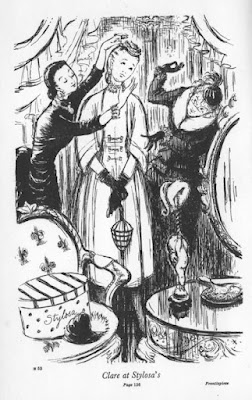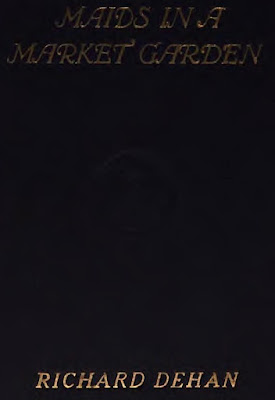"Anyway, we can't sell Orchards! Sell Orchards! Mum, how can you?"
"Everybody is selling these big houses," said her mother, "nobody can afford to keep them up. Look how difficult it is to keep these big rooms decently warm! We never thought about fuel in the old days, but now you just can't do it."
You might be forgiven for thinking this sounds very like a passage from a Mabel Esther Allan tale, and indeed, with the old house that can no longer be maintained and several spunky girls with lots of energy and ideas for saving it, it could just about be. Jam Every Day was shared with me a while back by my Fairy Godmother (whom I haven't mentioned a lot recently but who is still very much in the picture and occasionally sharing wonderful books and dustjacket scans with me), and it was a charming, fluffy break recently when I needed one.
The residents of the impractical Orchards, located in lovely Devon (which I now know personally is lovely!), are the Sieviers—Clare, the oldest, who has been delicate and is still insistently treated as an invalid by their mother; Celia, just finishing high school and furiously resisting her mother's plans to send her to a finishing school; Deborah (Deb), fourteen, just as gung-ho as her sisters; Celia's friend Bunny; and their widowed mother, who yearns for her days as the belle of the ball and wants the same glamour for her daughters, who disappoint her by preferring working in the dirt and the kitchen and starting a business selling jam. There's also Lady Hoxleigh, Celia's surprisingly practical, well-to-do godmother, who serves the story by providing some needed funding, but perhaps more importantly by derailing Mrs. Sievier's plan to send Celia to a finishing school and then taking Mrs. Sievier out of the way altogether while the girls' business is getting started.
 |
| Jam Every Day also includes three charming illustrations by Ruth Murrell |
None of the story of Orchards' revamping is remotely plausible, though there are some details about jam-making which I can't personally attest to but which seem to come from personal knowledge on the author's part. Implausible as it is, though, it's entertaining and enjoyable, with even a bit of a discovery of treasure at the end to round out the Mabel Esther Allan resemblance. There's also an appearance from the girls of Seldom Seen (1954), an earlier (similarly implausible, similarly enjoyable, similarly impossible to find) tale which Smith co-wrote with her sister Cicely Fox Smith and which I enjoyed back in 2019 but never got round to reviewing.
Yet, despite it's unrealistically idyllic portrayal of the girls' business ventures, Jam honestly still manages to be a bit more plausible than Maids in a Market Garden, a much earlier gung-ho business women tale set, this time, in beautiful, if distinctly rustic, Cornwall (I'm inadvertently recreating our recent trip with my reading). Reading a bit about Clotilde Graves, who mainly published under her Richard Dehan pseudonym and mostly seems to have written rather dreary pot boilers (at least one or two of which seem to be primarily remembered for their condescending racism), one might almost imagine she had feminist leanings—there's a strikingly modern-looking author pic of her with cropped hair and a sassy-looking attitude that would do her justice on a Hollywood red carpet even today. But judging from Maids, which I've wanted to read for several years due to my interest in tales of women starting businesses (from Dorothy Whipple's High Wages to Dorita Fairlie Bruce's The Serendipity Shop), one might be mistaken for reading too much into a haircut.
 |
| Clotilde Graves |
Indeed, the six impoverished women who, having been scammed out of much of their money in London, decide to become market gardeners on the ramshackle property of one of the women, certainly look like budding feminists when the novel begins. They were attempting, in London, to work toward the improvement of the situation of women, and on establishing their gardening business vehemently vow that no men shall be allowed to play a role—least of all a romantic one. It all seems most promising, and it starts out energetic and entertaining, just as I'd hoped.
Then, for some reason known only to herself, Graves immediately sets out to undermine all of that and turns the story into an eccentric but structurally typical romance of the Mills & Boon ilk, though with a couple of pairings so enormously unlikely that they might have given even M&B pause. Most of the women instantly turn to mush at the first glimpse of a man, and are safely married off in the end, and often by the second half I simply gave up on telling the women apart, so similarly idiotic was their behavior. Obviously, feminism doesn't have to mean not getting married, but these young women are so like dominoes, tumbling with increasing rapidity as the end of the novel approaches, that I felt Graves was actually making a mockery of their feminist impulses, and it left a sour taste indeed. Ick.
Add to this that, as we are too familiar with from other novels of the time, all the local yokels speak in thick dialect that took a bit of work of unpack (and was, for the most part, not worth the unpacking, as they're not given much character except some "golly gee willakers" type comments on the women's behavior and an occasional sort of "noble savage" soliloquy). An odd amount of time is spent on a religious revival gathering in which much heavy-handed religious philosophy is delivered (in glorious dialect, no less), and there's a final adventure with a tragic outcome that is so absurd that it left me cold—surely the dead man was destined from the beginning for a tragic end as a result of daring to love a woman who was so clearly above him?—after which I was breathing a sigh of relief to finally reach the end of this one. (It really did feel like "finally", though it's actually a rather short book.) Often, I don't finish books that don't grab me, but the trickery here was that Maids started out charmingly, and it wasn't till past the halfway point that I came to wish I could reclaim the wasted time of reading it.Sadly, it's Maids, in the public domain and readily available online, that can easily be tracked down for reading, should you wish to suffer the fate I have suffered. Jam Every Day, which, despite being giddily implausible, is quite a lot more enjoyable, is also, as mentioned above, quite difficult to find these days. Thus, thanks are due again to my Fairy Godmother!


Somehow these plots remind me of a major plot element in The Lark by E. Nesbet. And, yes, I would like to give Jam a try, especially since I do know a bit about jam making.
ReplyDeleteJerri